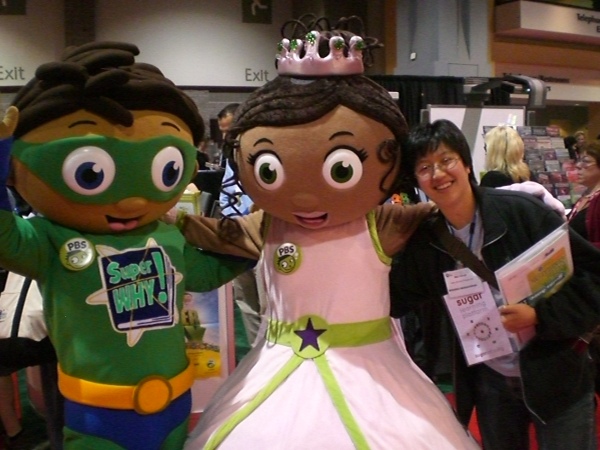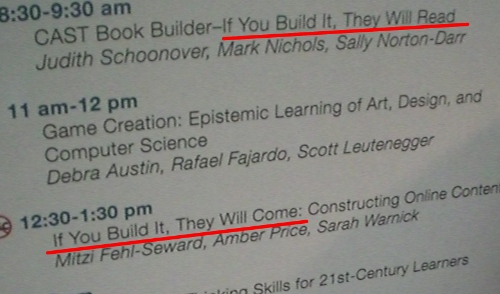NECC Monday continued
NECC, and then I'll finish my notes for Monday (with the expectation that I'll feel better enough afterwards to head to Tuesday's NECC; I love my immune system.)
Many attendees here have flipcams and netbooks - simple, few-function devices that they do not mercilessly power-use. They generally don't have time to recompile their kernel, let alone know what one is; they need to email their students NOW. They don't have time to debate the merits of .ogg vs .avi vs other video formats; their high school seniors are presenting NOW and they need to grab something off the shelf and hit a button and have a movie NOW and who has time to figure out licensing when you need to upload that movie for their parents NOW and we need a spreadsheet NOW so let's use Excel because it's on our computers anyway or maybe if we aren't on dial-up) Google Spreadsheets is sufficiently handy to fulfill our need for NOW. Default settings are important.
I need to talk with more teachers to find out how they find about technologies to use, but my current hypothesis is "click first hit from a Google search that has a massive easy-setup download button and is free or very, very cheap." By that metric, Fedora and Sugar have a long, long ways to go. The workshop on Google Apps, on the other hand, had a crowded line that stretched on down the hallway. The workshop wasn't run by Google; it was run by a teacher who had used the stuff. Same with the iPhone session.
Went by the Second Life pavilion. This was a master lesson on how to welcome newbies to a space in a way that makes them want to come back again and again. No sooner had I sat down than a volunteer approached me and offered to help get me started - sat with me for a half-hour walking me through making an account and doing basic navigation, didn't leave until I'd started talking with the remote welcome team in Second Life (who he enthusiastically described to me - "oh, she's wonderful! One of my best friends in SL! Tell her I say hello!"). By starting as a message courier, I rapidly got drawn into the conversation; the online greeters were equally excited, people kept coming up to me and welcoming me and showing me small interesting things (multiple welcomers treating you as if you were already a key part of their community == good feeling), the on-site volunteer kept popping in and asking if everything was all right and going "oh, you're doing X! That's awesome! Check out that thing near X!"
The thing that most impressed me was how they encouraged me to experiment and explore while simultaneously putting "you won't fail" fallbacks in place ("Mel, can you try to teleport and follow me? Don't worry, I'll teleport you if you get lost.") I tend to be more reckless than the average in terms of launching from unfamiliar trapeezes and trusting that I'll grab something to break my fall on the way down, but knowing exactly what safety net was in place was nevertheless comforting. They had scheduled tours; we walked around Genome, a world that a genetics professor had constructed (swim inside a cell! talk with chromosomes!) and then Biome (flying up to realize the globe of paramecium I'd been staring at was actually a water droplet in the lens of a gigantic microscope was a lovely moment) and were constantly encouraged to try things, play with things, come back and use the space anytime... Teachers sure do know how to make you feel comfortable taking risks in learning new things. We need to learn that.
Looking at ads like this, I wonder how computers ever got a reputation for making children into socially isolated beings.

Andy Pethan (engineer): "The focus on STEM! STEM! STEM! is driving me nuts!" (STEM = Science, Technology, Engineering, and Mathematics.) "I think English teachers are the biggest untapped market for technology in education. They could do so much with it." I pointed out to Andy that STEM teachers tend to be the ones that like the tech stuff - which he knew and acknowledged as obvious - and that sometimes English teachers became English teachers, or early childhood teachers, or... well, non-STEM teachers - not just because they loved English or small children or History or such, but also because they might be afraid of STEM. This is a blatant overgeneralization and there are tons of exceptions, but that's something that's been drilled into my head by my aunt (who teaches kindergarten) - the phrase "those who can't, teach," as untrue and unfair as we think it may be, actually did come from somewhere. Argh! Systems that don't work!
Happy exception: an art teacher and a physical education (PE) teacher from Ohio had teamed up to get another HP grant - I talked with Julie Lustic, the PE teacher, and was amazed. These teachers started out with very little technical knowledge. Julie described how she had to figure out how to save video files, struggling on her own until she discovered "File > Save As," and then how it was tough to figure out which folder it had just saved into - a reminder of how many computer skills I take for granted despite trying my best not to. I was awed by their tenacity; they'd obviously gotten far more digitally fluent on their own since.
Julie would film her students running, jumping, and skidding across the gym on scooters. "Kids love to watch themselves," she said. This was particularly helpful for the very young children (kindergarten, first grade) who were still developing a lot of fine and gross motor skills. Kids go through a continuum of development; for jumping rope, a 4-year-old might start by trying to windmill her arms awkwardly around at the shoulder, arcing over the back of her head; then over the next year or so progress to flailing elbow movement until finally, at 6, she's jumping rope fluidly with her hands down by her sides and the barest hint of wrist movement. By filming the kids, she was able to track who was in what development stage when, and convey that to the parents, who often would think "able to jump rope" was a binary "yes she can / no she can't" switch, and profited greatly from seeing the stages of learning they could then help their kid through.
She showed videos of adult athletes doing the moves she was about to teach them. "None of these kids had ever seen somebody vault before. They thought it was something I had invented." They got projectors so kids could see the videos closer to the scale of actual people. All three teachers also set a target of raising 4th grade math test scores; they did this by talking with the 4th grade classroom teachers to find out what vocabulary words they were using in their classrooms, then working those words into their lessons ("run around the perimeter of the gym, measure the circumference of your head..."). While Julie and I talked, Ida Bergson - the art teacher - played stop-motion videos of dancing geometric shapes that she and the kids had made. Ida and Julie were proud of how it had worked out, and also said it had taken an immense amount of extra effort to pull it off.
These were teachers clearly going above and beyond and having huge effects on their students. And they had to fight every step of the way. Nobody in their district took their grant application seriously, because "they thought we weren't going to get it anyway, sure, apply." When they got it, there was an uproar because "who gives a PE teacher a computer?" They were refused district tech support and told they were on their own, which is entirely reasonable. But when they tried to fix things on their own, they got in trouble for not going through the district tech support that had already said it wouldn't help them. There was a long story about how they had to keep on fighting through administration to keep doing this - even after the results had been apparent and positive.
We talked about where that might come from. Politically, it is unusual for art/PE teachers to get technologies the classroom teachers don't have themselves (then again, Julie and Ida put in the work to make the grant happen and succeed). It's new. It's scary. New things are scary. And if you barely have the resources to keep afloat, taking the energy to deal with scary new things is not high on your priority list; you kinda wish that it would go away. Another systems problem. It's hard to fix. I'm glad that Ida and Julie are still determined to fight the good fight; those kids in Cleveland Heights are very, very lucky.
My cousin Audrey watches this TV show, so I had to take a picture with the SuperWhy! team.

Walking around the vendor exhibition area, I was reminded that I'm not really the type of person that's attractive for a sales rep to talk with. For good reason. I look too old to be a K12 student but too young to be a teacher (though I'm old enough to be a brand-new one) or someone who actually makes or influences purchasing decisions (ok, wearing a t-shirt rather than business attire may have made a difference) so I wasn't pegged in the "education" space, and as a young woman I usually don't get pegged in the "technology" space, so educational technology vendors probably don't see me as a fit for who they ought to talk with. (Many happy exceptions here, but compared to the response to my friend Evan, a 21-year-old asian male engineer a in collared shirt, it was a fascinating contrast.)
I actually like being invisible, since I can easily choose to make myself visible by turning on the SHEER ENTHUSIASM!!! switch. This let me quietly wander around and watch what people were doing; there was an overwhelming amount of marketing shiny - far more than I would usually think contributes to conveying the real value of a product or service. Does a salesman dressing up as Indiana Jones (complete with whip and cave-themed booth) make your product any more valuable? Can you be more specific than "RAISES STUDENT ACHIEVEMENT!" in terms of what you'll do for me? Primary colors and exclamation points everywhere; buzzwords on every sign. There were a lot of mini-workshops where the presenter "taught" the audience something with their technology, be it a clicker response system or a smart whiteboard; they were very polished and energetic, but I felt like most of them were.... sort of manufactured. One booth had a film crew taping the presenter on a stage, elevated about 4 feet above an audience of roughly a dozen people - few enough to jump down and have a real conversation with, in any case.
I have very mixed feelings about branding and marketing and PR. (This means, of course, that if I ever get an MBA, it'll probably be in one of those, since that's the thing that makes me most uncomfortable. And I do realize the three are different things... the MBA interns at RH are trying to teach me the difference, but I don't yet really understand it. Anyway.)
NCWIT did see me walking by, and went "oh! you need to go encourage young women to pursue technology careers!" That's a paraphrase, but I got a packet of materials (...actually, with rather good statistics) and a howto on approaching a local school to volunteer to do a presentation or something with them. I've got mixed feelings about this too. I am female, and I do like technology (and education, for that matter), and... okay, so? I'm wearing sandals, and I like technology, and you don't see campaigns crusading for more sandal-wearers to get into IT. I was amused by how they tried to persuade me to particularly target low-income schools to volunteer at, though. "You know first-hand that engineering is a way to not have a low income!" I'm fairly certain that if you tallied up my work hours and my income since graduation, I would be making way below minimum wage, but that's what I chose when I decided that volunteering and working on interesting things to help people trumped getting a stable job with lots of monies immediately after getting my degree (which was certainly an option - and I can see that someone from a low-income background might be more motivated to pursue that route than a child of the middle class with backup savings, no student loans, and no family to support).
Apparently Joseph Schumpeter wrote about Disrupting Class 70 years before the book came out.
Generally speaking, I have not found the below photograph to be true.

As an open source geek, I find it interesting to see proprietary software vendors trumpet that their products give users the "freedom to create, share, and discover everywhere." If you buy their product, you are free to use it to create non-interoperable files and share those files with other people who have purchased the exact same software, and thereby discover what they've done. You can take your laptop running this software with you, hence the "everywhere." (Or maybe you can pay to make it work on your cell phone for a year.) I know this is a very biased view, but it makes me feel kind of like... "yes, cookies from a box are mighty tasty, but in comparison to cookies that my brother bakes from scratch - you really don't know what you're missing..."
Sat down next to two teachers (well, one is now a teacher trainer) for lunch. When I conveyed my mixed feelings about what I'd seen that morning, Sandy Scragg helped me sort it out by explaining that there were two tracks of thought in educational technology. The one we come from is the one that sees tech as a tool for creation, for enablement, for greater interaction between individuals. The other one is an entirely reasonable response to the current system which is full of high-pressure, high-stakes assignments and tests and unions and long hours and low pay and high turnover; it sees technology as a way to automate teaching, not to free teachers to be more creative, but to turn them into standardized automatons. "Can you believe, I actually heard them say, 'with this, your teachers don't even need to think!' They give you these scripts, say 'read this word for word,' the idea is, since we have high turnover, with a script it doesn't matter who's in front of the kids."
We talked about how K12 education in the US has had this huge "lectures are bad! we need to make things more interactive! no lectures!" thing going for quite some time, and when our most successful students from that system graduate and go to college as we hoped they would (the topic of whether college as The Desired Endpoint of K12 is another debate), where do they end up their freshman year but 200+ student lecture rooms. We also talked about standardized testing; Sandy differentiated between testing as a benchmark ("that's okay") vs high-stakes testing as The Thing that the futures of "students, teachers, entire districts" ride upon.
Later that afternoon, I sat with a teacher from the Bronx and another one from a tough part of Texas who were discussing the difficulties of dealing with parents. In the good ol' days (long before I was born, according to their dates - they're both veteran teachers), parents were More Involved; schools made an effort to reach them. They'd bus the parents in for meetings and workshops once a month after school, so they could teach the parents too. They had a place where non-working parents could go and study and learn in the library after they dropped off their kids in the morning. Nowadays they're seeing far more teenage parents who don't know how to raise their kids because they didn't have a chance to finish growing up themselves, 24-year-old mothers with 10-year-old children. The mothers still want to go out and party all night because they missed prom, missed hanging out with friends, dropped out of school, etc. because they had a kid to take care of... both the child-rearing and the childhood-having can't coexist, so both get done quite badly, in most cases. There was no mention of what happened with the dads.
That's all for Monday. I'll write about http://edtechfuture.org/ separately, since I hope to find out more about it today.
